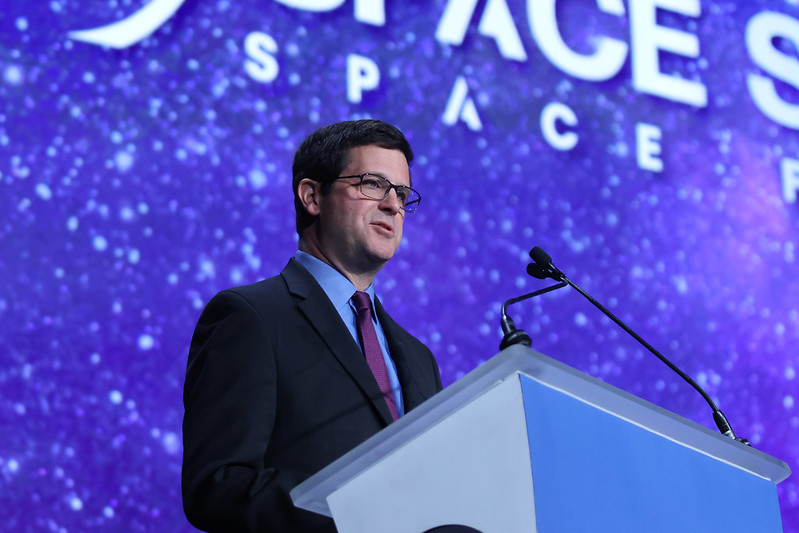Latest News
DoD Space Policy Official Plumb Outlines Steps to Normalize Space as an Operational Domain

Dr. John Plumb, Assistant Secretary of Defense for Space Policy spoke on Tuesday at Space Symposium. Photo: Space Foundation
The U.S. Department of Defense is working to normalize space as an operational domain, just like land, sea, and air — and doing so requires collaboration with both allies and the commercial sector, John Plumb, Assistant Secretary of Defense for Space Policy, said Tuesday at Space Symposium.
Plumb, who was confirmed in March 2022, is the first person to hold this position, and he is the senior civilian in the Office of the Secretary of Defense to conduct oversight of space warfighting policy.
Last year, Plumb’s office led a space strategic review on behalf of the Department of Defense and the U.S. Intelligence Community. The review came away with two major takeaways. China is the department’s “pacing challenge” in space, or biggest challenger. Additionally, normalizing space as an operational domain is key to deterring conflict in space. This means the DoD needs to adjust to coexisting in the space domain with an increasing number of other actors.
“Until very recently, space has only been the dominion of just a handful of nations. We have to stop treating space as a unique domain that is somehow different and for some reason requires special handling — that is counterproductive,” Plumb said. “By treating space as we do every other operational domain, we will enhance our ability to deter conflict and to preserve a secure and stable space environment.”
Cooperation with both allies and the commercial industry is key to normalizing space as an operational domain, Plumb said, and to the U.S.’s ability to deter aggression.
He said the department is strengthening space partnerships including the Combined Space Operations initiative, and the NATO space center. Plumb said his office is currently drafting a new international space cooperation strategy to help focus international engagements on space including areas like resilience and interoperability.
Plumb recognized the commercial space industry as a major driver of economic growth and innovation, particularly for contributions to national security including imagery and communications capabilities used in the war in Ukraine. The DoD wants to remove barriers for the commercial industry.
“We are engaged with companies and U.S. government stakeholders to understand the obstacles our industry partners face, including security concerns, and to identify any policy or legal challenges where changes might be helpful that could address them,” Plumb said. “Our goal is to help streamline the department’s ability to work with commercial partners and enhance U.S. national security.”
One barrier is the over-classification of space, Plumb said, which prevents the DoD from effectively partnering with commercial space providers when it can’t share timely threat information.
“Our classification policies for space related information are based on legacy information sharing agreements and legacy practices. And the fact is those policies and practices are slowing us down,” he said. “We cannot effectively partner with commercial space providers if we can’t provide them with timely threat information, and our defense industrial base partners tell us that over-classification costs us both time and money.”
The department is pushing “at the highest levels” to deal with this issue, he said.
Another line of effort is the lack of norms for responsible behavior in space. Plumb pointed to progress on this issue, with the United Nations recently adopting a draft resolution against anti-satellite missile tests, but he emphasized “more needs to be done.”
“Normalizing space as an operational domain will open the door to the deterrence architecture investments, to the partnerships, and to the norms of behavior required to keep space a stable, safe, and sustainable domain,” Plumb said. “Normalizing space will require massive cultural change. It’s not going to happen overnight. But now is the time to do it — and the Department finally has the organizational structure to execute it.”
Stay connected and get ahead with the leading source of industry intel!
Subscribe Now